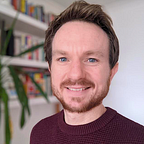Imagine if your boss sat you down and asked, ‘How do you think you’ve performed so far at work today?’
Where would your mind go first?
Do you think of the progress you’ve made? The tasks completed? Or does your mind immediately jump to something that went wrong, or all the things you wish you had finished but haven’t? You should have been much more productive, right?
Last week, I was training schoolteachers to teach mindfulness in schools and one of the key aspects of the course is to observe them guiding a meditation themselves.
We demonstrate it several times, then give them a script and ask them to do it in front of us, and one or two peers. Then, we ask them to give themselves two stars and a wish: two positive things about how they did and one thing that could have been better.
It’s kind of funny, and also a little sad, that people consistently fail to find something good to say about their performance. Their mind goes straight to what they think they got wrong and they often look at me after the meditation with a face that says, ‘That was a disaster!’
I usually have to interrupt them criticising themselves and force them to say something positive about what they’ve just done. And most of the time, they actually have done well!
However, their mind fixates on something they’ve forgotten or done in the wrong order, and ignores the things they got right. Sometimes, they’re the only one thinking the negative thing. For example, one person said, ‘My pacing was terrible!’ And we both responded, ‘Actually, your pacing was really good.’
Why am I telling you this? Because so many people do it! Many of us have a tendency to focus on negative points about how we’re doing and think we’re falling short on a daily basis, when we’re actually doing just fine in everyone else’s estimations.
I know this is a generalisation. Some people genuinely are terrible at their jobs and should be fired on the spot. Some people are very competent and know it. But there is a large chunk in the middle who lose a lot of sleep, as well as opportunities to feel good about themselves — perhaps even miss out on the chance to go for a promotion, because they’re so self-critical.
I would go as far as to say it’s delusional self-criticism. It’s a way of perceiving yourself that doesn’t match reality. It certainly feels very true in the moment though. So how do you change this?
Well, on this particular course, I think it was very powerful that we were regularly giving people honest feedback, with a combination of positive points and things to improve — but always more positive than negative. By the end of the four days, people were more able to say positive things about themselves.
A helpful (if a little uncomfortable) exercise that people do is to ask friends, family, clients and colleagues to write something about how they see you. You might be pleasantly surprised by what they say.
I write down wins, lessons learned and things I’m grateful for in my Best Self Journal (not an affiliate deal, I just love it). This trains my attention on the positive from each day.
Having a coach or mentor who is a real cheerleader for you, and can reflect the progress you have made back to you, is also very helpful.
It helps just to realise that you’re being self-critical and to know that you do not have to believe your thoughts. This is probably best explored through meditation.
It also helps to remind yourself you are not the only one who struggles to think of their performance in a positive light. I listened to a brilliant Radio 4 programme called Insecure Overachievers, in which very senior people in law and finance admitted that they’re consistently worrying about not being good enough.
One of the key lessons I’ve taken from teaching these courses is to do with neuroplasticity: the idea that your brain is constantly changing depending on how you use it. You can train yourself to be more positive, it just takes a lot of practice.
